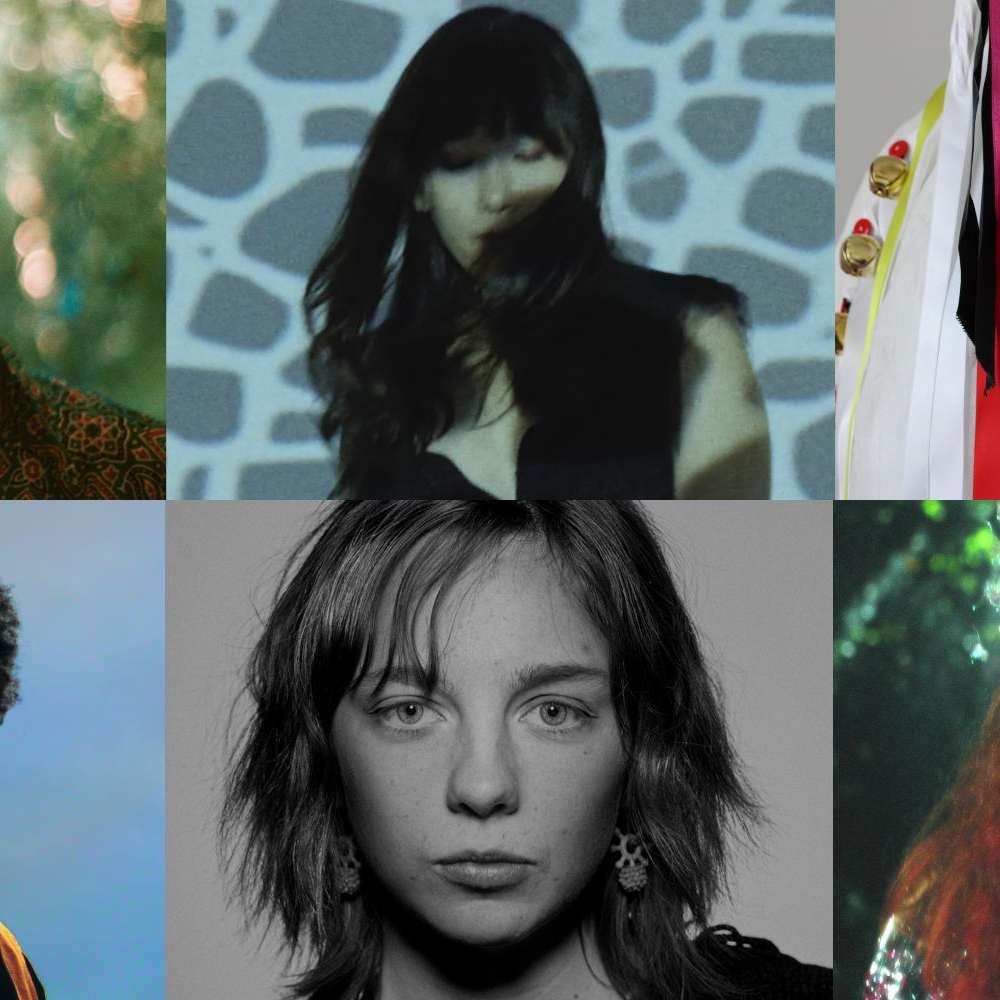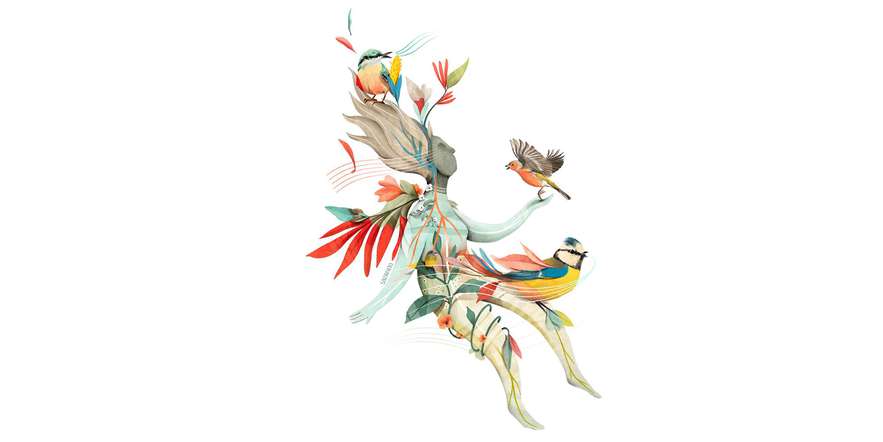
Ahead of the opening of Bird Bath this May, we caught up with Alice Eldridge and Alistair Appleton to find out more about the project.
What was your initial inspiration for Bird Bath?
Alistair:
The project popped into my head when I was working on the first Newhaven Festival a few years back. There’s a beautiful but rather hidden Norman church on top of the hill there which I’d always enjoyed visiting and was surprised that so few people from the town made the journey up the hill to see it.
So there was a sense of wanting to use that space. And then I had written a libretto for a composer friend about birdsong being a freer form of language - unburdened by convention and communal meaning. So it felt like a natural match to have wordless song in that building. From there, speaking and working with Alice, it developed quite naturally.
Alice:
Bird bath was Alistair’s initial impulse, but one that absolutely resonated with work I was doing at the time. Alistair asked if I’d help him realise an idea he’d had for an event for the first Newhaven Festival. I had been working for some time in ecoacoustics – exploring natural soundscapes from an ecological perspective as a means to infer something about the “health” of an ecosystem.
This involved several field seasons in Sussex and Ecuador, recording and listening to incredible sounds of birds, insects, frogs and toads. The focus of this research was developing ways to measure soundscapes and map it to ecosystem health, but my personal experience of soaking up these natural choruses was very rich. It made me realise what a profound effect being surrounded by pure, unadulterated song can have on you.
My background is as a musician, so when Alistair suggested the collaboration, I jumped at the opportunity to explore soundscapes creatively. We had both moved to Newhaven relatively recently and it felt like a really nice thing to “give” to the town, as well as a way to better get to know our local area.
What can visitors expect?
Alistair:
In a way there is no expectation at all that visitors will experience one thing or another. In the simplest sense they will experience an empty church filled with local birdsong. But what they personally remember, daydream or associate with those two things is infinitely varied.
Alice:
It really is as simple as the name suggests: we will fill the very beautiful St Peter’s church with bird song from our local region and invite people in. I am making the recordings this month from the biosphere and around, so it will be relevant in space and time! Expect to hear songs from the beach and the cliffs through the rivers to the downs and the woods.
View this post on Instagram
Alistair, can you tell us a little bit about your meditation and mindfulness practice and how it informs the concept behind Bird Bath?
Alistair:
Again, I don’t want people to think that Bird Bath is necessarily a meditative thing. But the location of an empty church does, in our culture, often point to contemplation and stillness. My meditation practice often takes sounds as its anchor: I will spend a few minutes simplifying the field of awareness down to just sounds and enjoy the variety and changing nature of the sonic world.
And then - as with all meditation - if you really lean in on that experience, it starts to fall apart. Who is the hearer? What or where is a sound? The deeper you listen the more mysterious phenomena start to feel.
How have you collaborated together to develop Bird Bath?
Alistair:
In the initial iteration in Newhaven, I asked Alice to help with the recordings and in her boundless enthusiasm she wove together recordings from all around Newhaven into an hour-long loop. This time around we wanted to improve the sound quality and make it easier to listen to. And Alice has brought in more sophisticated ways of playing the recordings spatially. We also wanted to frame the week of open exploration with a community breakfast to start the week and a music and meditation session to end it.
Alice:
The idea is very simple in essence. The project has grown very naturally. For the Brighton edition we have invited our extended communities to add some extra events. The installation will be framed with a dawn breakfast and a dusk event that invites different forms of interaction.
Our friends at Hospitable Environments will host an ‘ecosocial breakfast’ on the morning of International Dawn Chorus Day (4 May). Then long-term musical collaborators, Collectress will perform a short set after Alistair’s closing meditation as a means to invite the audience to come and express themselves with the birds.
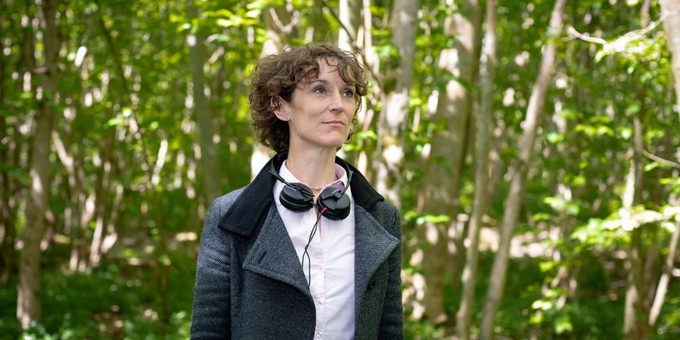
Alice Eldridge - photo by Stuart Robinson.
Alice, can you tell us about your creative process for Bird Bath and recording the bird song in nature?
Alice:
A mix of intuitive and planned. We are collaborating with The Living Coast, and they were keen to highlight the magnificent range of habitats we have here – from coastal and downland to rivers and woodlands.
I enjoyed the process of creating “a day in the life” style piece before for Newhaven. So I knew I wanted to take visitors on a little journey from dawn to dusk and across the habitats of the biosphere. Beyond that I really just listened and responded to what was there.
It has been a great excuse to explore the biosphere, and spend some precious time sitting quietly – especially at dawn and dusk – in some magical places. There are various bits of basic field craft involved, but really just common sense and intuition.
In terms of composition, it will be very simple. This isn’t about me expressing myself, just bringing the songs to the church. Perhaps the craft and creativity is in letting each habitat express itself and to try to take the audience on a smooth journey.
Can you tell us a little bit about your practice (as an ecoacoustician) and how it informs Bird Bath?
Alice:
As above, perhaps ironically, it was time spent recording natural soundscapes as “data” that really turned me on to the visceral value of soaking up song. This research has changed the way I think about our acoustic environment.
The term ecoacoustics was only coined in 2014 and we are still developing core concepts (it is hard to study things that don’t have names) and measurement tools (you can’t do science without quantifying things).
Sometimes people think of science as reductive, but I find it very generative. Over the last few years I have had the opportunity to work with amazing ecologists, neuroscientists and anthropologists. I’ve come to recognise the soundscape as a rich space where information and meaning are shared across species – the ultimate multispecies media.
We still don’t really understand why bird song and other natural sounds can have positive effects on people, but I have a hunch that it is a lot to do with the dynamics and rhythms of nature’s songs and choruses. I suspect this influences my approach to recording and editing. Let’s see!
Another key influence has been working with indigenous communities in Ecuador to help them apply for national recognition of the eco-cultural importance of their soundscape as a means to protect their territory. These communities recognise themselves as part of the forest, protecting itself.
There is no division between “nature” and “culture” – it inspired me to explore ways to help Europeans remember the unity of the two. That the dawn chorus breakfast was billed as “sound art” in a major European festival feels like a step in this direction.
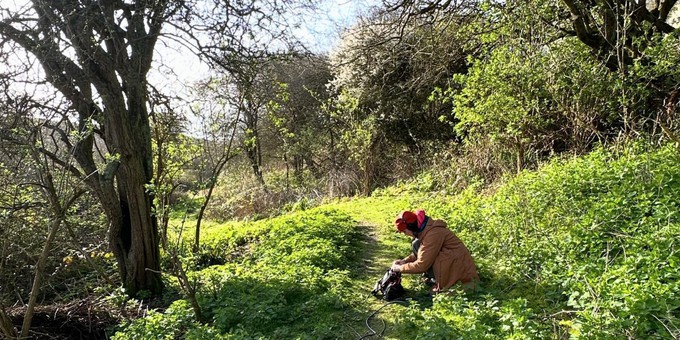
Alice recording in the field. Photo by Alistair Appleton.
What do you hope audiences will take away from their experience of the Bird Bath installation?
Alice:
There are all sorts of emerging theories and evidence about the “benefits” of listening to bird song – that it can bring our sympathetic nervous system online, reconnect us to wider nature, and even provide greater life satisfaction than a salary hike.
But our hope - and hunch - is that bird bath is a very personal experience. So I suppose that I hope that people will enjoy the space it offers in their own way. If this helps them better tune in to their inner and outer worlds when they step outside again, then that is fantastic.
In the course of making the soundtrack, I have spent most weekends in April exploring nooks and crannies of the downs trying to find places filled with bird sounds away from traffic noise. Those that are public we will share on a map – so perhaps some may be inspired to explore a part of the biosphere they have not visited before.
Alistair:
Alice and I have had some interesting discussions about whether or how a piece like this should be evaluated. My feeling is that I would like it to be as free from any interpretative encumbrances as possible. Some people come and sit for five minutes and then head outside again. Others lie down and stay for an hour letting their mind wander.
Secretly, I hope people will reconnect with the joy of listening and doing nothing (and also not being expected to do anything). I also imagine that the estrangement of hearing birds inside might make the experience of hearing them outside less taken-for-granted.
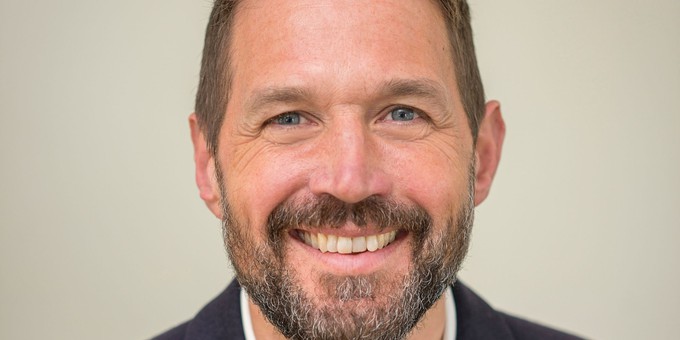
Photo of Alistair Appleton - image by Nick Ford.
What can audiences expect from the Sunday evening dusk meditation, performance and improvisation?
Alistair:
I’m really excited about the closing performance at St Peters on the 12th. After seven days of sonic soaking, I’m hoping the stones of the church will be ringing and resonant with the birds and so getting a flock of humans inside the space will be special.
I’m going to offer a meditation which takes the birdsong as its starting point and (as I mentioned above) uses these fleetingly beautiful sonic phenomena as a springboard into the deeper nature of our perceptions and knowledge of the world.
After that Alice and the Collectress will play and we’ll end with some free improvised music making weaving in and out of the birds. Who knows what will emerge? But I'm looking forward to it.
Alice:
This is an experiment for us – all our favourite things together! After a week of inviting audiences in to enjoy bird bath in their own way, we will offer a meditation and performance, before inviting everyone to express themselves in concert with the birds.
Alistair will lead a short guided meditation – with a dusk bird chorus. After a short break, Collectress will play a short piece to get the audience tuned in to their own performing. We recorded our first album in the same church, so this feels very special.
The piece we’ll play is inspired by the restoration of the Cockshut stream restoration project in the Ouse valley. We’ll then invite the audience to join us – so bring along an acoustic instrument, or your own voice.
Is there anything else you’d like to add about the project?
Alistair:
Apart from the dawn breakfast and the dusk concert St Peter’s is open throughout the week for free so you can come and go as often as you like. And it is - in a way - all about locale and the local. So if you live nearby - please come as often as you like.
Alice:
The friends of St Peter’s tell us that the church is the oldest building in Brighton – so we like to think that we are simply bringing back the bird song that it was once surrounded by. I have used this as an excuse to explore local ancient woodlands of a similar age, but some of them are private, so I can’t tell you where...
Bird Bath is part of the University of Sussex Festival of Ideas at Brighton Festival, 5 - 12 May 2024.
